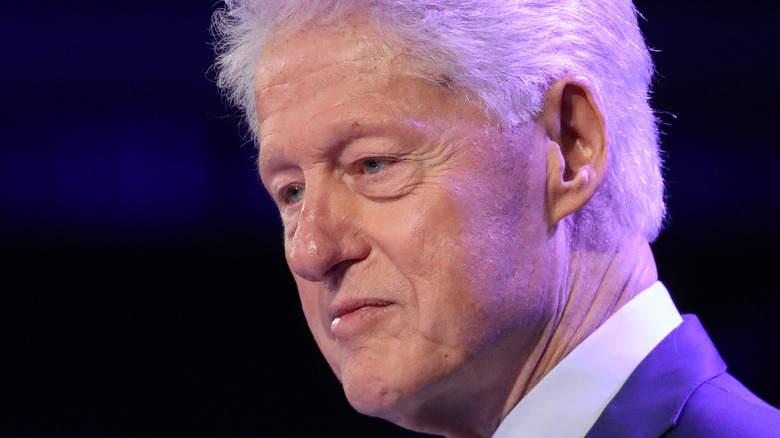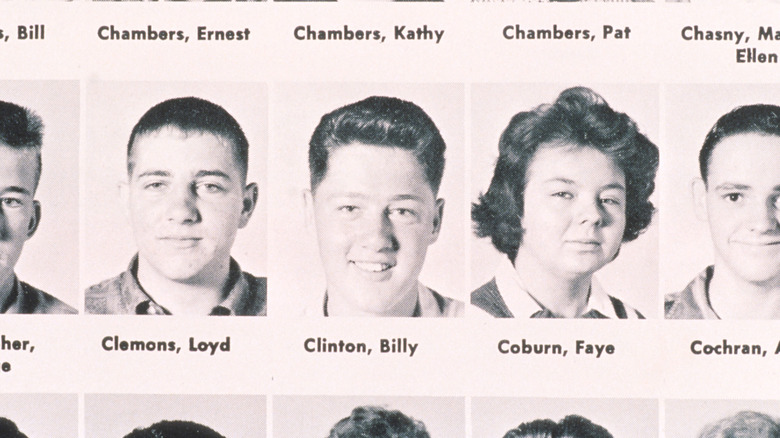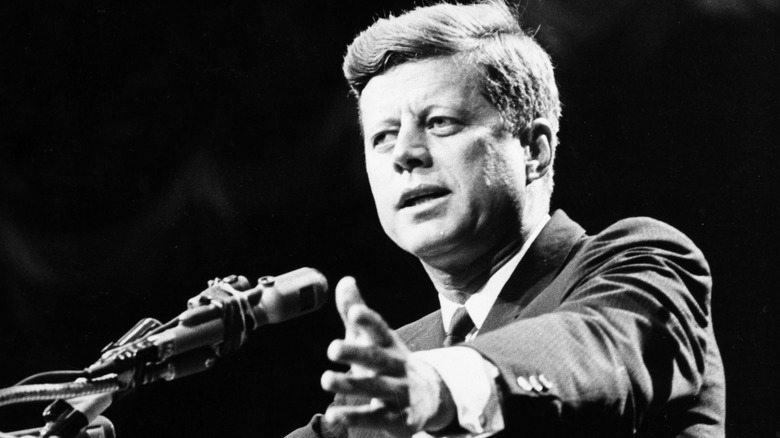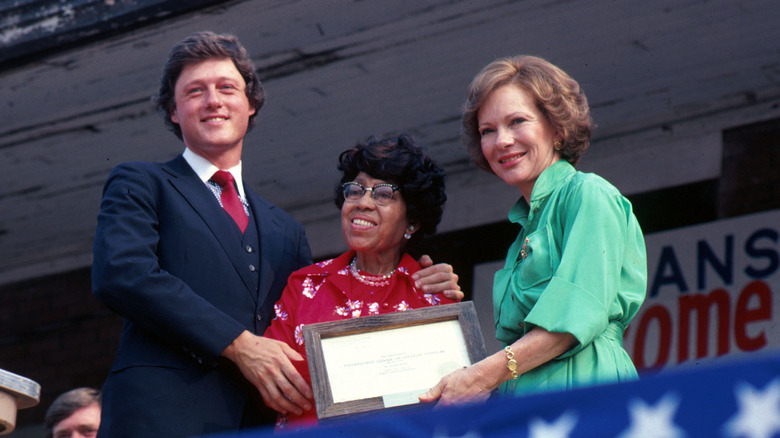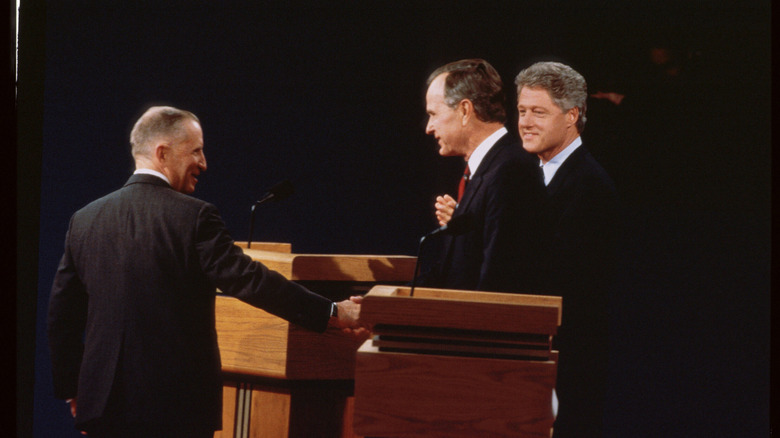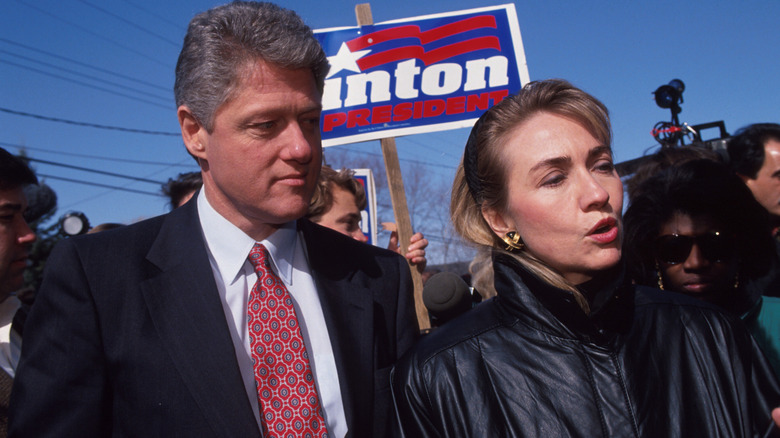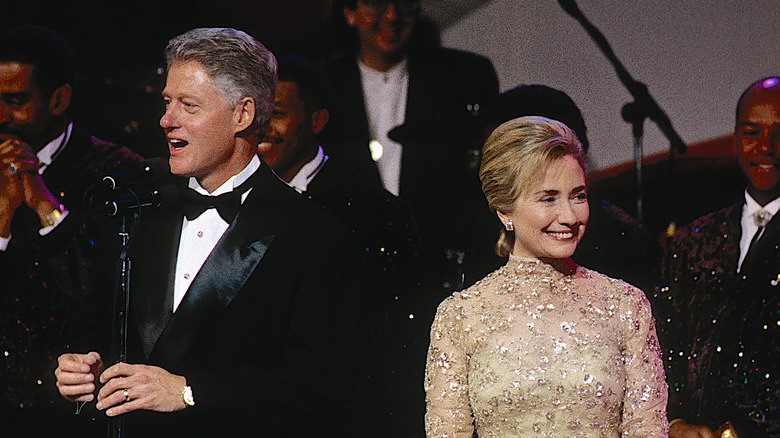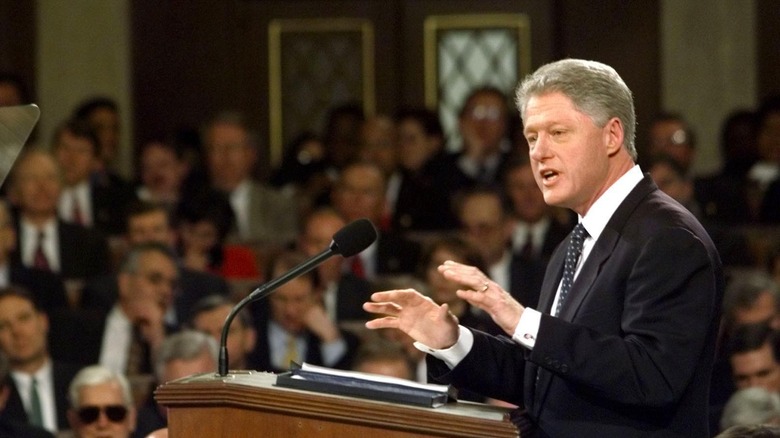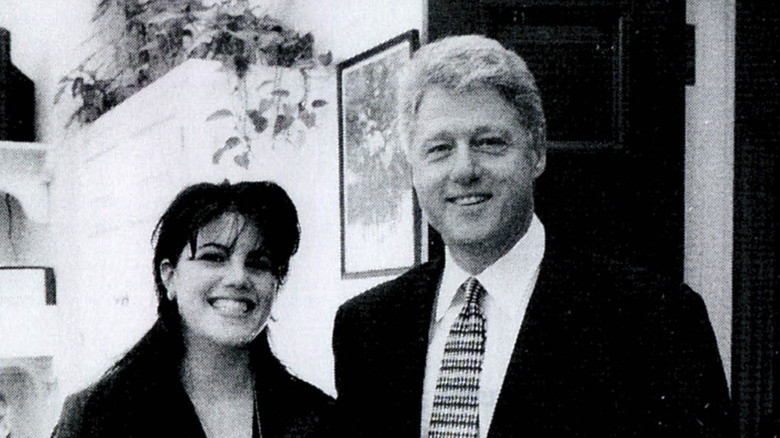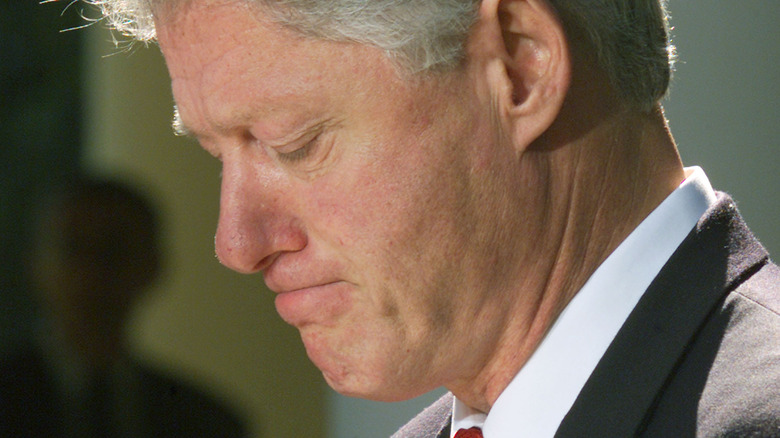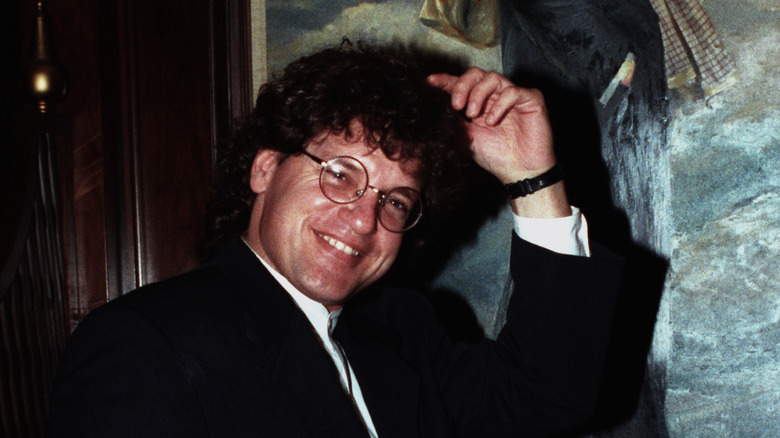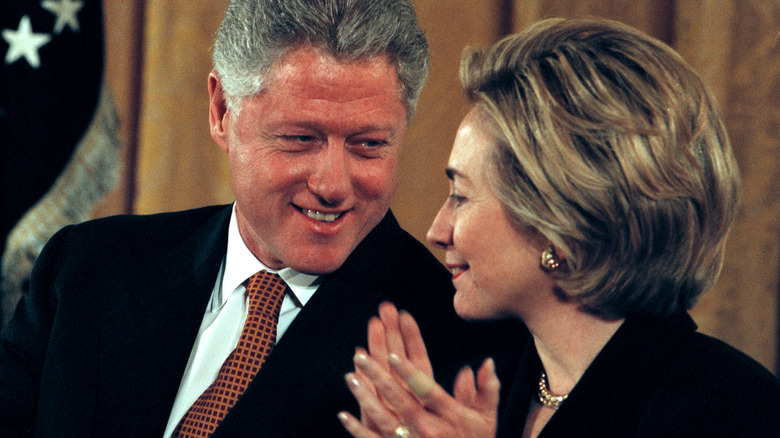The Untold Truth Of Bill Clinton
Depending on who you ask, Bill Clinton was either a solid if personally flawed president who oversaw an economic boom in the 90s, played a mean sax on the Arsenio Hall Show in 1992, and could deliver a political speech for the ages — or a sleazy, dishonest womanizer with no morals. Point is, love him or hate him, no one doesn't have an opinion on the raspy-voiced 42nd president (per Britannica), who might be the first face that comes to mind when you think of America in the '90s.
And yet, there's still plenty about the guy that most people don't know. You might be aware he was the governor of Arkansas in the 80s, or remember details about his 1992 dethroning of incumbent Republican George H.W. Bush. But did you know he got to shake president John F. Kennedy's hand in 1963, that he was so good at speaking that he actually ad-libbed most of an entire State of the Union address, or that he has two Grammy Awards?
The man formerly known as President Bill Clinton is surrounded by a basket-load of weird facts: This is the untold truth of Bill Clinton.
Clinton had a rough childhood
As the Miller Center points out, Bill Clinton's dad, William Jefferson Blythe, died tragically in a car accident a few months before he was born in 1946. That left grieving 22-year-old widow Virginia Blythe to raise young Bill with the help of her mother, Edith Cassidy, in Hope, Arkansas. While a young Virginia tried to enjoy her twenties, Cassidy played a huge role in shaping young Bill's personality. She instilled a love of reading in the kid and set him on a bright academic path. But her role as a parental figure would soon be supplanted by Virginia's second husband.
When Bill was four, his mom remarried to Roger Clinton, and he soon whisked the two of them away to Hot Springs, Arkansas. It might sound like a well-deserved bit of happiness for Virginia, but Roger was no saint. The car dealer was an abusive alcoholic who quarreled with his wife on a regular basis.
Nonetheless, Bill was an astounding student, a talented saxophone player, and a dedicated church-goer (he loved hearing Gospel music). But at home, he frequently found himself in the middle of sometimes violent arguments between Virginia and Roger. Still, Bill took the man's last name instead of his birth father's (and mother's) name of Blythe.
Clinton got to meet President Kennedy
Like many high schoolers, 16-year-old Bill Clinton wasn't sure what he wanted to do with his life. Britannica says he was a gifted student, musician, and athlete — he wobbled in dedication to these three paths, as well as other options like law and even religious ministry. But two events would have a profound effect on Clinton and permanently alter his path toward public service, according to Biography.
The first was hearing Martin Luther King Jr.'s "I Have A Dream" speech in 1963, arguably the most iconic and powerful moment of the Civil Rights movement, which saw Black Americans marching for civil rights long denied to them in much of the U.S., due to racist policies.
The second was meeting President John F. Kennedy later that year, just months before his assassination in Dallas that November. According to the article. Kennedy had just come back from a triumphant European tour, which included the "ich bin ein Berliner" speech in Germany. The president was addressing the assembled students of Boys Nation, a mock political club that fostered bright young minds, including Clinton. Clinton pushed his way through the crowd and briefly shook Kennedy's hand, before the president moved on down the line. It wasn't much, but he bragged about the moment to his fellow Boys Club endlessly. Future Minnesota congressman Jim Ramstad, who shared the bus with Bill on the way back, claimed Clinton told him, "Someday, I'm going to have that job."
Clinton lost his first re-election bid as Governor of Arkansas in 1980
Bill Clinton's had a pretty good track record when it came to elections. He was elected governor of Arkansas three times consecutively in the '80s, leading up to his 1992 presidential campaign, per Britannica. He then won both of his runs for the White House, and ... well, there's really nowhere to go from there. Sure, he was rooting for his wife Hillary in 2016, who lost her presidential bid, but that was hardly a mark on his own electoral record.
But Bill did taste defeat once — in 1980, according to the National Governors Association. He was first elected to the governor's mansion in his home state of Arkansas in 1978, after spending two years as the state's Attorney General. However, he actually got booted from office in the next election, losing to Republican Frank White.
The Clinton House Museum says that numerous factors contributed to Clinton's defeat, like the issue of tax hikes on automobile registration and a controversy about discretionary spending in the state government. One scandal involved a program designed to train low-income residents to chop and distribute wood to other needy neighbors. With a budget of $62,000 (worth a lot more then than it is now), they'd only produced six woodchoppers and three cords of wood. Then, a minor refugee crisis unfolded when Cuban refugees rioted, while being temporarily held in Arkansas on their way to federal processing facilities. With his "Cubans and Car Tags" slogan, Frank White narrowly won the race.
Clinton was an extreme longshot when the 1992 election began
When the 1992 presidential election began, nearly everyone thought incumbent Republican George H.W. Bush was a shoo-in to keep the big job. The 80s were the era of Reagan, and Bush, as Reagan's VP, was the anointed successor to carry the conservative torch for the next eight years. And it was working: per Britannica, Bush was wildly popular early in his presidency, and Roper Center says he enjoyed approval ratings of nearly 90% — a feat almost unmatched since approval polling began. But it was all downhill from there. When he broke his promise not to raise taxes, the previous year's lightning victory in the Gulf War seemed like old news. The first sign that the president was in real political trouble was an uncommonly tough (but ultimately unsuccessful) primary challenge by conservative Pat Buchanan.
Then came upstart Arkansas governor Bill Clinton, who quickly established himself as an electrifying speaker with fresh ideas, while enjoying a head-turning polling surge after the Democratic National Convention. Personal scandals plagued Clinton during the campaign, but his charisma and empathy with struggling Americans carried him over the finish line.
Many people blamed the third major independent candidate, billionaire Ross Perot, who ran on a balance-the-budget message, for spoiling the election for Bush. The theory held by some was that Perot had siphoned a decisive amount of votes away from him, giving Clinton the win. But Texas Monthly debunks this, saying Perot pulled votes from Bush and Clinton equally.
Clinton won with only 43% of the popular vote in 1992
In the 1992 U.S. presidential election, as far as the popular vote was concerned, gaining a total of 43% actually put Clinton comfortably ahead of the other two major candidates in the race. And yes, there were two major candidates. Clinton's main opponent was the incumbent Republican president and former vice president under Ronald Reagan, George H.W. Bush. But independent Ross Perot also threw his hat in the ring, and shook up the race in a big way. Perot didn't come close to winning because he didn't carry a single state. But still, walking off with nearly 20% of the popular vote without the support of a major party is no small feat.
But of course, the United States doesn't choose presidents by popular vote like most other republics and democracies in the world. Love it or hate it, we have an Electoral College, and nobody gets to sit in the White House without seizing at least 270 votes, according to USA.gov.
When the final count was in, the American Presidency Project says Clinton beat the necessary amount by 100, claiming 370 electoral college votes by capturing not just all the classic blue states, but many traditionally red ones as well, like Montana, Tennessee, and his home state of Arkansas. The remaining 168 went to the president, who also seized 37.4%, while none broke for Mr. Perot — despite winning 18.9% of the votes.
Clinton was the first Democrat elected to a second term since FDR
During the over four decades between the multi-term presidencies of Franklin Delano Roosevelt, who was elected towards the beginning of the Great Depression in the 1930s, and Bill Clinton, who presided over the dot com boom in the late 90s — so quite a jump in time — not a single Democrat served two full terms in the Oval Office, per ThoughtCo.
Harry Truman didn't seek re-election, per Politico, and John F. Kennedy was assassinated in his first term, as described by the JFK Library. The latter's successor, Lyndon B. Johnson, finished Kennedy's term and won a single election but chose not to seek re-election in 1968, per History. And in 1980, Britannica says Jimmy Carter lost resoundingly to Ronald Reagan.
But it wasn't all sunshine and roses for the GOP, either. Eisenhower served two terms, sure, but the next two Republicans set bleak records in American electoral history. Nixon became the first president to resign in disgrace following the Watergate scandal. And his successor Gerald Ford only took over because of this but then lost re-election, making him the only president to have served without ever winning an election (via the Miller Center).
Clinton once ad-libbed a huge speech to Congress
When you're giving any speech, the fewer the surprises, the better. That's especially true if it's a televised address to Congress. But, sometimes things go wrong, and if they do, it really helps to be as talented an orator as Bill Clinton.
In 1997, one of the most embarrassing State of the Union addresses in U.S. history almost happened, as reported by The New York Times. Then-President Bill Clinton took the stage before the eyes of the nation to give the year's most watched speech. Unfortunately, an error caused the entire speech to be mashed together into an endless wall of text, making it difficult to follow on a teleprompter. Luckily, aides managed to re-insert paragraph breaks at the last possible minute. But the problems didn't stop there. Clinton himself sometimes wandered so far off-script that the teleprompter operator couldn't figure out where he was. It may have helped that, according to Time, the nation was distracted by the simultaneously televised OJ Simpson verdict.
But this was hardly the first time Clinton had ad-libbed speeches, according to his former speechwriter David Kusnet. Writing for CNN, Kusnet says Clinton improvised as much as 20% of his first State of the Union address, explained his healthcare plan from memory after another teleprompter foul-up, and made a habit out of adding more to speeches. In one instance, according to Kusnet, Clinton's meandering turned a 3,136-word speech into nearly 6,000 words, doubling its length.
Clinton was only the second president to get impeached
Clinton's personal scandals and rumored indiscretions had plagued him since the 1992 Presidential campaign, according to Britannica. But it all came to a head in his second term, when news broke about his affair with White House staffer Monica Lewinsky.
By 1998, the Monica Lewinsky affair was all anyone was talking about, and none of the president's attempts to deny the allegations, such as his statement, "I did not have sexual relations with that woman" (via jw00534), did much to throw the press off his tail. Indeed, as reported by CNN, Republicans and the press piled on, Ken Starr investigated, and Clinton was caught lying to investigators under oath: It was this latter perjury that led to his impeachment, although the effort to remove Clinton from office failed in the Senate.
Prior to this event, according to History, only one other U.S. president had been impeached: Andrew Johnson, for undermining reconstruction efforts after the Civil War, and he was acquitted in the Senate by one vote. Richard Nixon, contrary to popular belief, was never actually impeached for obstructing justice during the Watergate scandal. After being informed that it would lead to almost-certain conviction in the Senate, according to History, he resigned the presidency before the impeachment process officially began. After Clinton, President Donald Trump was impeached twice: once in 2019, for trading military aid for dirt on his political rival Joe Biden, and again in 2021, for trying to overturn the 2020 election.
Clinton has some policy regrets about being President
Clinton's presidency isn't just notable because of the Monica Lewinsky scandal. ProCon says he also oversaw a booming economy and the appointment of Ruth Bader Ginsberg to the Supreme Court, raised education standards, and helped incorporate rapidly emerging technologies like the internet into both military and civilian spheres — modernizing life in the U.S. But AllGov says the man himself has many regrets about his time in office. When reflecting on the 1994 Omnibus Crime Bill, for example, which cracked down on minor drug offenses, Clinton said, "I signed a bill that made the problem worse, and I want to admit it." He also regrets the actions he took during the war on drugs, too, because he later stated they just pushed the problems over the border and into Mexico.
Regarding LGBTQ+ issues, Clinton pleaded with the Supreme Court in 2013 to rule against the Defense of Marriage Act that he signed in 1996. Similarly, he regrets the "Don't Ask, Don't Tell" policy, which prevented openly gay service members from joining the military, but says he had to approve it because it was between that and an outright ban.
He's also expressed remorse over the Commodity Futures Modernization Act, according to AllGov, which made predatory lending easier and contributed to the 2007-08 financial crash, and for not acting during the 1994 Rwanda genocide. Regarding the latter, he says the U.S. "could have saved at least a third of the lives that were lost" if he had sent troops in to respond.
Bill's half-brother Roger has gotten in legal trouble multiple times
As evidenced by the Monica Lewinsky scandal, per CNN, Bill Clinton didn't need any help embarrassing himself, but that doesn't mean a helpful hand was ever absent: Enter Bill's younger half-brother, Roger. During Hillary Clinton's 2016 campaign, Roger made headlines after getting arrested for driving drunk in southern California. But it wasn't the first time he'd had run-ins with the law, or that he drew his brother Bill into his legal messes.
As reported by The Washington Post, when Bill was serving as governor of Arkansas in the 1980s, Roger was busy getting arrested for trying to sell cocaine to an undercover cop. He pled guilty and was imprisoned for a year. However, on his last day in office as president, Bill pardoned his little bro along with numerous other people, which invited more scrutiny.
But Roger wasn't done yet. While the pardon scandal was still making headlines, he got arrested for his first DUI. Since then, he got into more trouble for allegedly trying to take a cut of the profits for a Hillary 2016 fundraiser he helped organize, and also for being personally bankrolled by Bill. Those last two incidents weren't necessarily illegal, but they looked bad, especially in light of his prior history — including the occasion when he tried to profit off the Haiti earthquake in 2010, by getting a shady real estate contract there.
Bill Clinton has won a few Grammy Awards
Bill Clinton may not typically evoke thoughts of music, unless his epic saxophone solo on the Arsenio Hall Show (via JR85) during the 1992 presidential campaign comes to mind. But it may be surprising to learn the 42nd president actually has two Grammy Awards under his belt, and two more nominations, according to IMDB.
To be fair, none of these are for music, technically, but rather in the spoken word category. He got his first Grammy in 2004, winning "Best Spoken Word Album for Children" alongside such celebrated children's entertainers as the late Soviet Union leader Mikhail Gorbachev. He also won Best Spoken Word Album the following year, for his autobiography "My Life." While that was his last win, he was nominated for the "Best Spoken Word Album" award twice more: in 2008 for narrating his next book, "Giving: How Each of Us Can Change the World," and in 2013 for his work on "Back To Work: Why We Need Smart Government For A Strong Economy."
Bill's not the only Clinton who's picked up some Grammys, either. His wife Hillary actually won the award before he did — and while he was president, no less, for "It Takes A Village" in 1997 (per IMDB). And she was nominated for it in 2004 for "Living History (Hillary Rodham Clinton)," but lost to ... Bill Clinton.
